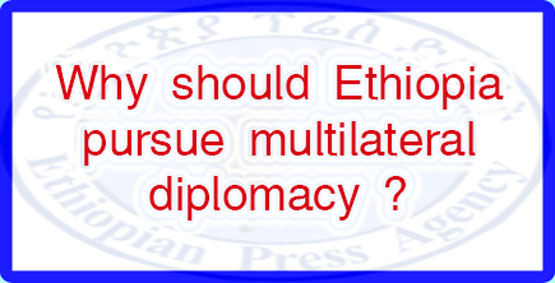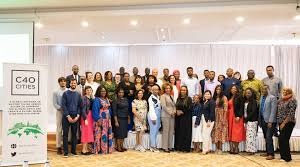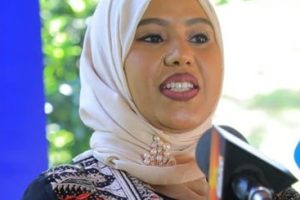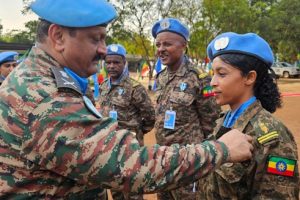
In his closing remarks to the highlevel policy discussion forum last week, Prime Minister Dr. Abiy Ahmed said his government will uphold all bilateral and multilateral diplomatic principles will continue. Until recently, external relation of countries circled in military and economic power diplomacy, currently Ethiopian diplomacy added third dimension, the soft power diplomacy which focus on discussion with all strong and small states with due respect.
In a ways that seconds the idea of the Premier, experts in foreign policy and diplomatic affairs on their part also said to further strengthen the Horn of African diplomatic relations and economic integration, the countries should give special attention to multilateral diplomacy. The scholars added that EthioEritrea relation should develop to institutional level to make it sustainable as the two countries relation should also give priority to regional diplomacy to create trust among the regional countries.
They also argued that the issue of Inter Governmental Authority for Development (IGAD) and Eritrea should seriously see. The diplomatic experts and former Ambassadors said that the Horn of Africa has a new hope of political and economic integration after the restoration of peace between Ethiopia and Eritrea, yet the region should give due attention to multilateral diplomacy for effective economic integration.
Former United Nations Secretary General Special Envoy, Hirut Gebreselassie said that the restoration of peace initiative between Ethiopia and Eritrean is a positive outcome for both countries and for the horn in general. According to her the diplomatic ties between the countries of the horn should be institutionalized to make it sustainable and to enable it play its role in the horn integration.
Abdul Mohamed, Senior Consultant at African Union and Foreign Policy Analyst on his part said that the first peace process of Ethio Eritrea was unilateral decision and bilateral agreement, and has continued so far in the same way. The peace process has changed the hard border between the two countries to soft border. The peace between these two countries have many meanings for the horn integration. As to Abdul the issue of Eritrea should not be seen as exceptional to other neighbors.
If the Ethio-Eritrean relation does not evolve into a regional and multilateral level, it is going to have its own side effect. “Ethiopia is big country in the region and the most responsible one for the peace and development of the region; hence all neighboring countries need to strengthen their relations with Ethiopia. At the same time the countries see Ethiopian new relation with Eritrea suspiciously.” Abdul said.
Adding that to develop trust among its neighbors that its relation with Eritrea is not affecting any country and not at the cost of other relations, Ethiopia is responsible to develop the relation to multilateralism by attracting Eritrea to the regional diplomacy. Foreign Policy Analyst, Former Ambassador Hiruy Amanuel on his side stated that though the restoration of peace between Ethiopia and Eritrea is a glimmer of hope to the horn’s peaceful relations and economic integration, Ethiopia should seriously see it to minimize the tension and suspicion of other countries due to different reasons.
“When two counties start new diplomatic relations, it should not affect the former allies’ friendly relations,” Hiruy said. Ethiopia has a diplomatic homework to persuade the neighboring countries that its relation will not affect any country and to build trust among each other the relation should come to multilateralism. In the past two decades, the relation of Ethiopia with Sudan, Djibouti and Kenya developed to family level, which is an open road for regional integration, Hiruy said.
Hence, the relation with Eritrea should keep this familiar relation on its place and the new relation must add its own positive role to strengthen the former journey of the regional integration. Hiruy added that up to now Eritrea did not show any feeling to join IGAD and at the same time Ethiopia is the chair of IGAD for long. One mechanism of practicing multilateralism is through regional and continental institutions/organizations, hence the Eritrean stand on IGAD should be viewed as one issue and Ethiopia should play its role to persuade Eritrea to join the regional institution, he said.
“Unless Eritrea joins IGAD, it is impossible to think regional economic integration and multilateral diplomacy in the region,” Hiruy noted. In the past, the horn of Africa is known for its conspiracy political relations among each countries and one country’s relation with another neighbor so far was seen a threat for the other neighbor, Dr. Solomon Derso, Foreign Policy Analyst and African Union Human Rights Commissioner argued.
Since Ethiopia has built friendly relations with almost all countries of the Horn except Eritrea during the past two decades and these countries are thinking they sided with Ethiopia during the past, Ethiopia should give attention for both the new relation and the existing ones. According to him the first phase tripartite relations among Ethiopia, Eritrea and Somalia is a good way for the region if it develops to multilateral level by including all neighbors, he added.
The big constraint in Horn integration during the past two decades was the absence of peace between Ethiopia and Eritrea. Hence, to use this opportunity for the integration of the region as started by the commitment of Prime Minister Abiy Ahmed, the diplomatic activity should focus on multilateralism. The experts argued that after this opportunity of the peace restoration between the two countries which came up to now bilaterally, it should give priority for multilateralism to develop trust with their neighbors.
The scholars argued that to develop the relation to multilateral level, Ethiopia should take the responsibility and it needs all countries commitment. According to the scholars, Ethiopia has ages old tradition of multilateral diplomacy at regional, continental and global levels as it has participated in the foundation of United Nations, African Union, IGAD and Non Alignment Movement.
They also argued that differences in climate change, nuclear proliferation, migrants issues, international trade, development and humanitarian aids and military unions among powerful countries is leading the world powerful countries to leave multilateralism and gives priority to bilateral diplomacy.
According to the diplomats this kind of diplomacy has an effect to the third world countries. To protect their national interest, Horn of African countries should interactively work on developing their multilateral diplomacy and regional economic integration through winwin diplomacy.
The Ethiopian Herald, March 30/2019
BY DARGIE KAHSAY





